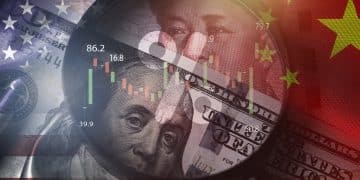How inflation is impacting consumer credit in 2025

Anúncios
Inflation significantly impacts consumer credit by raising loan interest rates, reducing purchasing power, and altering credit availability, requiring strategic financial management to navigate the challenges effectively.
How inflation is impacting consumer credit in 2025 is a question many are asking. As prices rise, it’s crucial to understand how this affects your borrowing options and financial decisions.
Anúncios
Understanding the relationship between inflation and credit
Understanding the relationship between inflation and credit is vital to navigating your financial future. As inflation rises, so do prices. This change impacts lenders and borrowers alike, making it important to know how these two factors interconnect.
How Inflation Affects Interest Rates
As inflation increases, the cost of borrowing money typically rises too. Banks anticipate the loss in purchasing power. Consequently, lenders may raise interest rates on loans. This means consumers might find themselves paying more over time.
Impact on Credit Availability
Inflation can also influence the availability of credit. During high inflation periods, lenders might tighten their criteria. This means:
Anúncios
- Borrowers may face stricter checks on credit scores.
- Less credit may be available for personal loans and mortgages.
- Lenders might require larger down payments.
These changes in credit availability affect consumer spending. Many individuals may delay significant purchases because of high borrowing costs.
Furthermore, those with variable rate loans could see their monthly payments soar as rates rise. This situation can lead to financial strain for borrowers, particularly those already living paycheck to paycheck. As inflation continues, understanding its effects on your credit is crucial to managing your finances effectively.
Current trends in consumer credit for 2025

Current trends in consumer credit for 2025 show a shifting landscape influenced by various economic factors. As we look ahead, understanding these trends can help individuals make smarter financial choices.
Increased Use of Technology
One noticeable trend is the growing reliance on technology in the credit industry. Digital platforms are becoming the norm for applying and managing credit. With the rise of mobile apps, consumers can access their credit information in real-time. This ease of access empowers them to monitor their credit scores.
Focus on Credit Education
Another emerging trend is the emphasis on credit education. Lenders are increasingly providing resources to help borrowers understand their credit scores and how to improve them. Many offer:
- Online courses about managing credit.
- Tools for tracking credit health.
- Personalized tips for better financial decisions.
As people become more knowledgeable about credit, they can make informed choices that lead to better financial health.
Additionally, we’re seeing more lenders adopting flexible credit options. This trend allows consumers to choose repayment plans that fit their budgets. Borrowers may be able to adjust their payment schedules based on their income levels, which can mitigate financial stress.
Finally, ethical lending practices are on the rise, focusing on transparency and fairness. This shift means that consumers can expect clearer terms and conditions when applying for credit. Transparency builds trust, and as loans become more accessible, borrowers can feel confident in their choices.
Effects of inflation on loan interest rates
The effects of inflation on loan interest rates are significant and can impact borrowers in various ways. When inflation rises, the cost of borrowing tends to increase as well. This relationship is crucial for anyone considering taking out a loan.
Why Interest Rates Rise with Inflation
As inflation increases, lenders adjust their interest rates to compensate for the expected decrease in purchasing power. This means that the interest rates on loans, including mortgages, personal loans, and credit cards, may see substantial hikes.
Impact on Fixed vs. Variable Rates
Borrowers should be especially aware of how inflation affects both fixed and variable interest rates. Fixed-rate loans lock in the interest rate for the entire term. This can be beneficial during times of rising inflation, as the borrower is protected from future rate increases. On the other hand, variable-rate loans can increase significantly, impacting monthly payments.
Borrowers with variable loans might see their payments go up quickly as inflation forces rates higher. This fluctuation in payments can cause financial strain, especially for those on tight budgets.
In many cases, when inflation is expected to remain high, central banks may raise the benchmark interest rate to stabilize the economy. This decision further influences lending rates across the board. Consequently, consumers need to stay informed about economic trends.
Borrowers should consider locking in rates when they are low. Understanding the dynamics of how inflation affects interest rates can lead to better financial decisions. By planning ahead, individuals may avoid the pitfalls of rapidly increasing costs associated with higher loan rates.
Impacts on consumer purchasing power

The impacts on consumer purchasing power due to inflation are felt widely and can significantly alter spending habits. As prices on goods and services increase, each dollar a consumer has buys less than it did before.
Understanding Purchasing Power
Purchasing power refers to the amount of goods and services that a consumer can buy with their income. Inflation erodes this power, meaning people have to spend more to buy the same items. This situation can lead to tough choices, especially for low- and middle-income earners.
The Effect on Daily Expenses
Everyday expenses such as food, gas, and housing tend to rise during inflation. Consumers might notice that:
- Grocery bills become higher.
- Utilities and gas prices increase.
- Rent and housing costs may see significant hikes.
As these costs rise, families may need to adjust their budgets, cutting back on non-essential spending. This can lead to a decrease in overall economic activity as consumers tighten their belts.
Moreover, when purchasing power decreases, consumers often increase their reliance on credit. This dependency can lead to higher debt levels, as individuals borrow to maintain their standard of living. However, as inflation drives up interest rates, servicing this debt can become more challenging.
In summary, the impact on consumer purchasing power during inflation is profound. It alters spending habits, affects savings, and can push individuals toward higher debt levels. During periods of high inflation, understanding these impacts is essential for financial planning and managing household budgets effectively.
Strategies to navigate credit challenges
Navigating credit challenges can be daunting, especially in an inflationary environment. However, there are effective strategies to help consumers manage their credit wisely and maintain financial stability.
Build and Maintain a Healthy Credit Score
A solid credit score is crucial for securing loans and favorable interest rates. To build and maintain this score, it is essential to:
- Pay bills on time, as late payments can negatively affect credit.
- Keep credit utilization low by paying down existing debt.
- Regularly check credit reports for errors and dispute inaccuracies.
By actively managing their credit score, consumers can improve their borrowing options.
Consider Fixed-Rate Loans
Given the rising interest rates due to inflation, opting for a fixed-rate loan can provide reliability. With a fixed rate, borrowers lock in their interest rate for the life of the loan. This approach protects them from future interest hikes, allowing more predictable budgeting.
On the other hand, variable-rate loans can lead to fluctuating payments that may become unaffordable. Individuals should carefully evaluate their financial situations before choosing their loan types.
Create a Budget and Cut Unnecessary Expenses
Establishing a budget is essential in times of financial uncertainty. By tracking monthly income and expenses, consumers can identify areas where they can cut costs. Simple strategies include:
- Reducing dining out or subscription services.
- Shopping for better deals or discounts.
- Making use of public transportation instead of relying on a personal vehicle.
By making these adjustments, individuals can save more money and pay down debts faster.
Additionally, seeking financial advice from professionals can provide tailored strategies tailored to overcoming specific credit challenges. This support can help consumers navigate their unique situations more effectively.
FAQ – Frequently Asked Questions About Consumer Credit and Inflation
How does inflation affect my loan interest rates?
Inflation typically causes loan interest rates to rise, as lenders adjust rates to compensate for the loss of purchasing power.
What can I do to maintain a healthy credit score during inflation?
Pay your bills on time, keep your credit utilization low, and regularly check your credit report to ensure accuracy.
Is it better to choose a fixed-rate loan in an inflationary environment?
Yes, fixed-rate loans provide stability since your interest rate remains the same, protecting you from future rate increases.
What strategies can I use to manage my budget during inflation?
Track your expenses closely, identify areas where you can cut costs, and consider using budgeting tools to help manage your finances.





